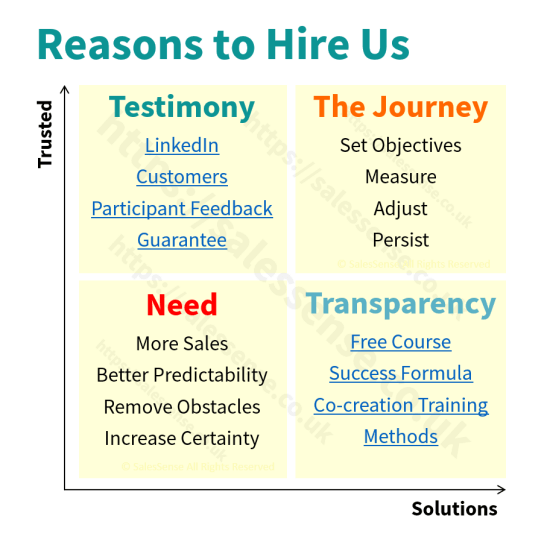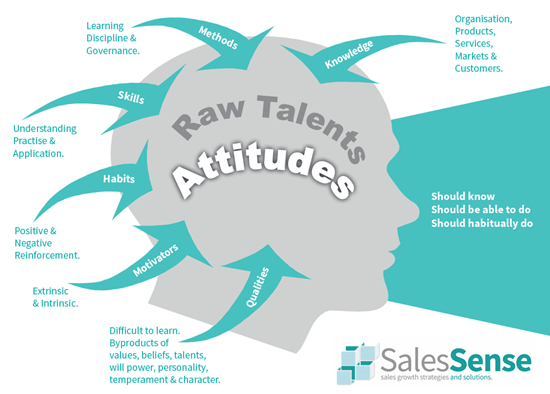Skills and methods for recruiting salespeople.

Recruiting salespeople is a high-risk endeavour yet hiring the right salespeople is the greatest contributor to sales success.
What sets this training course for recruiting salespeople apart from others?
- It is based on research, best practices, and professional experience. See the list below.
- Studying the material in advance frees the training time for discussion, exercises, planning, and preparation.
- Creating action plans for adopting new practices and embedding new habits.
- Delivery by someone with considerable experience in finding and selecting salespeople.
- The opportunity for one-to-one learning.
- Delivery by the course author.
- Guaranteed results.
Remove the risk from sales hiring decisions. Take this sales recruitment training course to reduce recruitment costs, save management time, and accelerate sales growth.
Eliminate the luck factor and swell the ranks of overachievers in your organisation.
Key Takeaways
- Pitfalls to avoid.
- Effective job specifications.
- CV assessment shortcuts.
- How to save time in the selection process.
- How to have candidates reveal themselves.
- Ways to test for the most important sales skills.
- Have referees reveal what you need to know.
Repeatedly we hear managers say, "Selecting new sales staff is a lottery". It need not be so. You can dramatically reduce the risks by taking the guesswork out of recruitment.
Learn how to have unsuitable candidates reject themselves. Use a simple, repeatable method to zero in on the right candidate. Discover how the right question style will reveal everything you want to know.

In this fast-paced programme, learn how to avoid those expensive hiring mistakes that inhibit sales performance. Get the know-how and begin choosing salespeople who will perform.
Sales Interview Skills Training Course Includes:
- Pre-course questionnaire.
- Pre-work preparation guide.
- Personalised workplace assignments.
- Programme materials.
- Online resources.
- Career-long support.
Materials and resources
- Self-study recommendations.
- Accelerated learning guide.
- Programme slide decks, tools, and templates.
- Hiring mistake cost assessment.
- Sales role specification template and examples.
- CV analysis tools.
- Sales skills and habits assessment.
- Sales skills and habits verification questions.
- Telephone interview prompt sheet.
- Reading people report.
- Recognising personality style assessment.
- Persuasive questions report.
- Revealing interview questions.
- Referee verification prompt sheet.
Recruiting Salespeople Training Delivery Options
One to One
Learn through ten 1-hour or five 2-hour virtual meetings with the course author.
£995 - Learn More.
One to One on a per-session basis.
£150 - Learn More.
Via Online Group Training - delivered through ten 1-hour or five 2-hour virtual classroom sessions with the course author.
£3995 for up to fifteen people - Learn More.
Group Training on a per-session basis.
£450 per 1-hour session for up to fifteen people. Learn More.
Fees exclude applicable VAT.
Traditional Classroom
Delivered over one or more days at a conference venue or the customer's offices. Contact us for fees.
What are the best practices for interviewing and selecting salespeople?
Recruiting salespeople successfully demands more forethought, planning, and preparation than is commonly invested. Establishing a process to identify candidates with the right combination of skills, personality traits, and motivation, pays dividends. Here are some best practices to follow:
1. Define Key Qualities and Competencies
Identify the skills, experience, and qualities that align with successful sales performance in your organisation.
Common attributes include resilience, communication skills, confidence, and a proactive attitude.
2. Use a Structured Interview Process
Develop a set of standardised questions to evaluate each candidate on the same criteria, ensuring fairness and consistency. This structure allows you to more easily compare candidates and reduce unconscious bias.
3. Include Behavioural Questions
Behavioural questions (such as "Tell me about a time you closed a difficult sale") help reveal how a candidate has handled real-life situations. Look for specific examples that demonstrate persistence, creativity, and customer-focused strategies.
4. Assess Cultural Fit
Salespeople need to work effectively within your organisation's culture. Ask questions that can help determine if they will align with your values and work environment. For instance, in a highly collaborative team, ask about experiences of teamwork and collaboration.
5. Evaluate Emotional Intelligence (EQ)
Emotional intelligence is key for building rapport with clients and handling rejection. Look for signs of self-awareness, empathy, and the ability to manage emotions.
6. Include Role-Play or Simulated Sales Scenarios
Role-play exercises can demonstrate how candidates interact with potential customers.
Observe how they handle objections, present products, and close a sale, which provides insight into their selling style and adaptability.
7. Check for a Track Record of Success
Review previous sales performance, focusing on consistent results and the ability to achieve or exceed targets. If candidates lack direct sales experience, look for transferable achievements that suggest a strong work ethic and goal orientation.
8. Assess for Motivation and Ambition
Sales roles often require resilience and a drive to succeed. Ask candidates about their goals and what motivates them. Look for individuals who have clear, measurable objectives and a genuine desire to progress in their sales career.
9. Request Referrals and References
Speak to previous managers or colleagues to verify the candidate’s achievements, reliability, and overall conduct.
Insights from past employers can be invaluable, especially in terms of understanding how they handle challenges.
10. Consider Assessment Tests or Psychometric Testing
Tests for aptitude, personality, or sales-specific skills can provide objective data to complement interview findings. Ensure any tests used are fair, relevant to the role, and add meaningful value to the selection process.
11. Communicate Clearly about Expectations
Be upfront about performance expectations, targets, and any challenges of the role. Candidates who understand and embrace these expectations are likely to stay motivated and productive.
12. Ensure Prompt and Transparent Follow-Up
A clear, timely follow-up process respects the candidate’s time and reflects positively on your organisation. Whether or not they’re selected, respectful communication leaves candidates with a positive impression.
Following these practices will help you find salespeople with the right skills, mindset, and fit for your organisation, maximising their likelihood of success in the role.
Guarantee
We unconditionally guarantee the quality and effectiveness of our services. In addition, we warrant that the application of the principles, methods, and practices presented in our materials will lead to a gain in value equivalent to at least five times the fees. Should you decide that our services have not met this guarantee, we will refund your fees promptly and courteously.
Want Something Different?
Please Ask:
If you are recruiting salespeople and need to reduce hiring mistakes, hire the right salespeople, or make better selection decisions, we can help. Telephone +44 (0)1392 851500. Alternatively, use the contact form here or send an email to custserv@salessense.co.uk.






















